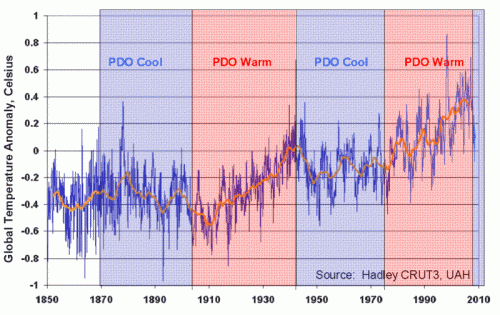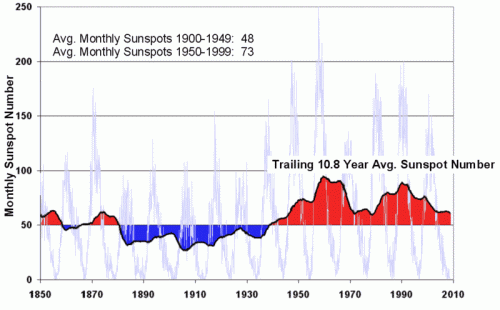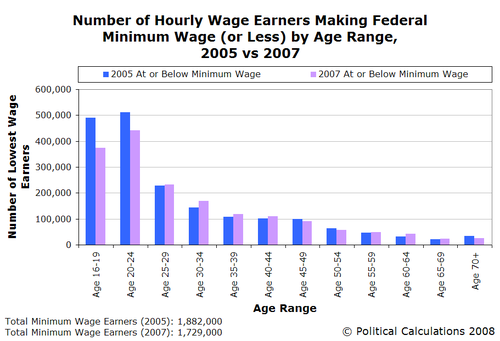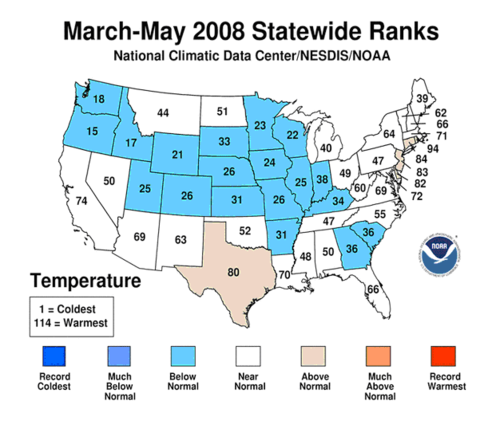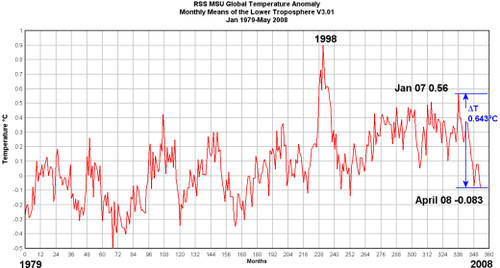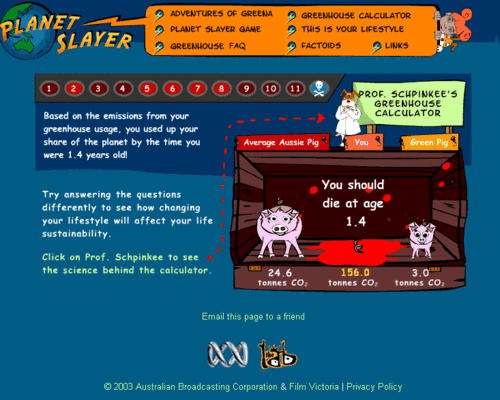Happy Birthday Vladimer Lenin Earth Day. I have a few thoughts for the day:
Sucking the Oxygen Out of the Environmental Movement
Observe today how little of the discussion is about anything other than climate. There are still many environmental issues in the world that can be improved by the application of man's effort and technology -- unfortunately, climate is the least of these but the issue getting the most attention. Consider how the global warming panic has sucked the oxygen out of the environmental movement. Ten years from now, I predict that true environmentalists will be looking back on the hysteria over trace amounts of CO2 in the atmosphere as a huge setback for real environmental progress.
Environmentalism and Socialism
If you attend any Earth Day events today, notice how many of the speeches and presentations and such are anti-corporate, anti-trade, anti-capitalist, anti-wealth screeds, and have little to do with the environment. If you actually go to a live Earth Day event, you will see why the selection of Lenin's birthday was no accident. You will not see this on the network news, because the media is sympathetic to the environmental movement and tends to edit the socialist rants out as PR protection for the environmentalists, knowing that American audiences would lose sympathy for them if they listened to the whole package. (This is mostly an American phenomenon - I have found from my brief travels in Europe that the media there does less such editing, perhaps because they know their audience is more comfortable with socialism).
The Climate Denier Trick
There are a lot of reasons not to be worried about "inaction" on global warming. To justify the enormously expensive cuts in CO2 productions, on the order of 80% as supported by Obama and Clinton, one has to believe every element of a five-step logic chain:
- Mankind is increasing CO2 concentrations in the atmosphere
- Increased atmospheric CO2 causes the world to warm (by some amount, large or small)
- The increases in CO2 from man will cause substantial warming, large enough to be detectable above natural climate variations
- The increases in world temperatures due to man's CO2 will have catastrophic impacts on civilization
- These catastrophic impacts and their costs are larger than the enormous costs, in terms of poverty and lost wealth, from reducing CO2 with current technologies.
Climate alarmists have adopted a rhetorical trick that no one in the media seems willing to call them on. They like to wage the debate over global warming policy on points one and two only, skipping over the rest. Why? Because the science behind numbers one and two are pretty strong. Yes, there are a few folks who will battle them on these points, but even very strong skeptics like myself accept points one and two as proved.
Here are some examples of how this trick works. If, like me, you do not accept steps 3-4-5 in the above logic chain, you will be called a "denier." When asked what a denier means, a climate alarmist will often position this denial as somehow disputing #1 and #2. On the other hand, if one publicly accepts #1 and #2, the alarmist will shout "QED" and then proceed to say that strong action on CO2 is now justified. When an alarmist says that the a consensus exists, he is probably correct on points 1 and 2. But he is absolutely incorrect that a consensus exists on 3-4-5.
Don't believe me? Think back to the early Republican debate, where the moderator asked for a show of hands whether [I can't remember the exact question] man was causing global warming. The implication is that you either have to accept this whole logic chain or not. One can see why Fred Thompson begged to have 90 seconds to explain his position, and why the moderator, presumably in the alarmist camp, denied it to him.
Over the last year or two, skeptics have gotten a lot better at making their argument. Most all of them, like I do, begin their arguments by laying out a logic chain like this and explaining why one can believe that man-made greenhouse gases cause warming without accepting the need for drastic climate action. The result? Alarmists have stopped debating, and/or have declared that the debate is "over." Remember that last great Al Gore climate debate? Neither do I.
The Single Best Reason Not To Be Worried About Climate
I could, and have, in my books and videos, made arguments on many points in 3-4-5 (links at the bottom of the post). In four, no one ever considers the good effects of warming (e.g. on growing seasons and crop yields) and most every other problem is greatly exaggerated, from hurricane formation to sea level rises. And in five, every time someone has tried to put a price on even small reductions in CO2, the numbers are so enormous that they are quickly suppressed by a environmentalist-sympathetic media. Suffice it to say that even the climate-sanctimonious Europeans have not been willing to pay the price for even slowing down their CO2 growth (which has risen faster than in the US), much less reducing it.
But in this logic chain, there is little need to argue about four and five if #3 is wrong. And it is.
The effects of CO2 acting alone on temperatures are quite small -- And everyone, even the alarmists, agree! A doubling of CO2 concentrations, without other effects that we will discuss
in a moment, will heat the earth no more than about 1 degree Celsius (though several studies recently have argued the number is much less). This is not some skeptic's hallucination -- this is
straight out of the IPCC third and fourth assessments [IPCC text quoted here]. In fact, the IPCC in their reports has steadily reduced their estimate of the direct contribution of CO2 on temperatures. CO2, acting
alone, warms the Earth only slowly, and at this rate we would see less
than a degree of warming over the next century, more of a nuisance than
a catastrophe.
But some scientists do come up with catastrophic warming
forecasts. They do so by assuming that our Earth's climate is
dominated by positive feedbacks that multiply the initial warming from
CO2 by a factor of three, four, five or more. This is a key point -- the
catastrophe does not come from the science of greenhouse gases, but
from separate hypotheses that the earth's climate is dominated by
positive feedback. This is why saying that greenhouse gas
theory is "settled" is irrelevant to the argument about catastrophic
forecasts. Because these positive feedbacks are NOT settled science.
In fact, the IPCC admits it does not even know the sign of
the most important effect (water vapor), much less its magnitude. They
assume that the net effect is positive, and in fact strongly so - on the order of 60-80% feedback or more, nearly unprecedented numbers for a long-term stable physical system [more on feedback and its math here]. This is particularly ironic because alarmist Michael Mann, with his hockey stick, famously posited that temperatures over the last 1000 years were incredibly flat and stable until man started burning fossil fuels, a proposition that is hard to believe if the climate is dominated by strong positive feedback. Note that when people like Al Gore say things like "tipping point," they are in effect hypothesizing that feedback is greater than 100%, meaning that climate can be a runaway process, like nuclear fission.
In fact, with the 100 or so years of measurements we have for temperature and CO2, empirical evidence does not support these high positive feedbacks.
Even if we assign all the 20th century warming to CO2, which is
unlikely, our current warming rates imply close to zero feedback. If
there are other causes for measured 20th century warming other than
CO2, thereby reducing the warming we blame on CO2, then the last
century's experience implies negative rather than positive feedback in
the system. As a result, it should not be surprising that high
feedback-driven forecasts from the 1990 IPCC reports have proven to be
way too high vs. actual experience (something the IPCC has since
admitted).
However, climate scientists are unwilling to back down from the thin
branch they have crawled out on. Rather than reduce their feedback
assumptions to non-catastrophic levels, they currently hypothesize a
second man-made cooling effect that is masking all this feedback-driven
warming. They claim now that man-made sulfate aerosols and black
carbon are cooling the earth, and when some day these pollutants are
reduced, we will see huge catch-up warming. If anything, this cooling
effect is even less understood than feedback. What we do know is that,
unlike CO2, the effects of these aerosols are short-lived and therefore
localized, making it unlikely they are providing sufficient masking to
make catastrophic forecasts viable. I go into several reality checks
in my videos, but here is a quick one: Nearly all the man-made cooling
aerosols are in the northern hemisphere, meaning that most all the
cooling effect should be there -- but the northern hemisphere has
actually exhibited most of the world's warming over the past 30 years,
while the south has hardly warmed at all.
In sum, to believe catastrophic warming forecasts, one has to believe both of the following:
- The climate is dominated by strong positive feedback, despite
our experience with other stable systems that says this is unlikely and
despite our measurements over the last 100 years that have seen no such
feedback levels.
- Substantial warming, of 1C or more, is being masked by aerosols,
despite the fact that aerosols really only have strong presence over
5-10% of the globe and despite the fact that the cooler part of the
world has been the one without the aerosols.
Here's what this means: Man will cause, at most, about a degree of
warming over the next century. Most of this warming will be
concentrated in raising minimum temperatures at night rather than
maximum daytime temperatures (this is why, despite some measured
average warming, the US has not seen an increase of late in maximum
temperature records set). There are many reasons to believe that man's
actual effect will be less than 1 degree, and that whatever effect we
do have will be lost in the natural cyclical variations the climate
experiences, but we are only just now starting to understand.
To keep this relatively short, I have left out all the numbers and
such. To see the graphs and numbers and sources, check out my new climate video, or my longer original video, or download my book for free.
Update: Very relevant article by Roy Spencer on the over-estimation of feedback in climate models.
Many of us, especially those who were trained as meteorologists,
have long questioned the climate research community's reliance on
computerized climate models for global warming projections. In
contrast to our perception that the real climate system is constantly
readjusting to internal fluctuations in ways that stabilize the system,
climate models built upon measured climate behavior invariably suggest
a climate system that is quite sensitive - sometimes catastrophically
sensitive "” to perturbations such as those from anthropogenic
greenhouse gas emissions. Unfortunately, it has been difficult to
articulate our "˜hand-waving' concerns in ways that the modelers would
appreciate, i.e., through equations.
After years of pondering this issue, and after working on our two
latest papers on feedbacks (Spencer et al., 2007; Spencer and Braswell,
2008, hereafter SB08), I believe that I can now explain the main reason
for this dichotomy. Taking the example of clouds in the climate
system, the issue can be introduced in the form of a question:
To what extent are climatic variations in
clouds caused by temperature change (feedback), versus temperature
change being the result of cloud variations?
